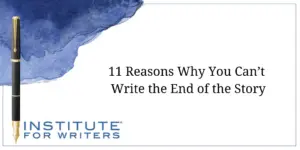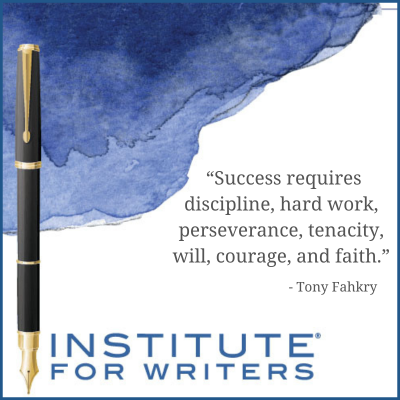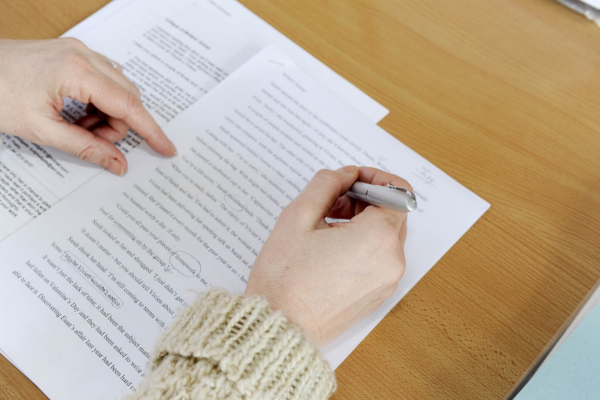
Use Specific Language to Energize Nonfiction Writing
Nonfiction writing doesn’t have to be boring. Learn to recognize generalities and replace them with specific, concrete language and vivid sensory details.

I’ve heard writers complain about not being able to finish what they start. Are you in that spot? There are a number of possible reasons why.
I understand not outlining—I’m a pantser myself—but I do have a goal in mind with each story. The goal is specific to the character and the plot of the book or short story. I have a tentative ending. Sometimes that changes along the way. How I think my character might win/grow/change might not happen, but he or she does win/grow/change in some way. The stories I have in my files that aren’t finished usually either had too vague a goal or started more as a character sketch with no specific problem for that character to solve.
 Where is your story going? Can you state it concisely? Here’s a model to follow:
Where is your story going? Can you state it concisely? Here’s a model to follow:
Character wants _________ despite __________ (obstacle).
Be specific. Here’s an example from one of my projects: Kayla is determined to save her father from cancer despite the fact that no one in the family will talk about his absent brother, the most likely person to be a bone marrow match. When I get stuck, I remember what her goal is.
Sometimes, I think we start something and then find we don’t care enough about the idea. In other words, the story isn’t inspired by any passion. That passion can be the character himself, the theme of the story, the plot or the solution—something that is important to the writer. In these cases, look first for things you are passionate about and build your next story about one or more of those things.
What do you care about? Can you include one of your passions in the story where you’re stuck? Or is it time to dump this story and work on a new one that includes one or more of your passions?
Writing is hard. Getting to the end is hard. But if you enjoy the process of writing, writing is worth doing. I like putting words together. The act of writing makes me happy. Sure, it’s great when I’m totally done with a piece. But first I have to finish a first draft and be proud of that accomplishment. I may have to do research to see how something works—that can be a “down the rabbit hole” activity as one piece of research leads me to something else. I like when rewriting makes my story better. Listening to feedback stirs me to make other improvements. It’s a process. Some parts are easier than others. Some are more enjoyable than others. But all of them are necessary.
What do you like about the process of writing? Please come up with more than one reason.
 4. Writing without having learned the basics.
4. Writing without having learned the basics.Do you know what is meant by showing versus telling? Character point of view? Third person versus first person? Past and present tense? I’ve spent time learning about these writing basics and many others from writing courses, books, articles, workshops, and critiques. This gave me the skills so I know how to do the craft. And I continue to learn.
What are you doing to improve your craft?
If you don’t like reading a particular type of writing, why would you write it? It means you aren’t familiar with the basic rules of the genre that any avid fan knows. Remember, the writer is the first reader of anything she’s written. If the writer can’t please herself, how can she please anyone else?
What do you most like to read? Are you writing in that category/genre for that audience?
Of course, it won’t be good enough. Nothing quite matches our expectations. But that’s what revision and rewriting are for—to make our writing better, closer to what we want it to be. I love when I go back and read something I’ve written and am surprised by it. In a positive way. Many writers don’t read their published books because they can’t change them anymore. Overcome the fear of not being good enough by being in a support group of other writers. For me, my critique group encourages each other to press on.
Who encourages you in your writing? If you don’t have anyone, find at least one person.
I love this Chinese proverb, “Talk doesn’t cook rice.” You’ve got to do the writing, not talk about it. For me, if I talk about a story too much before I write it, then the impetus to write it is gone. This isn’t the case for some writers. But consider what would happen if writers spent more time writing the stories than talking about them.
Are you talking about your story more than you are actually writing?
It takes time to finish a story. It means writing has to be a priority. What will you give up so you can write? TV, Facebook, surfing the net, crafting, shopping? It doesn’t mean you can never do these things again, but you need to determine what is more important. I used to sew and do scrapbooking. I haven’t done the latter in many, many years. And only picked up a few sewing projects during the pandemic. Instead, I write.
 Ultimately it comes down to what Jane Yolen says, “BIC”—butt in chair. Write, and keep writing! A scheduled writing time makes me show up to write—I work better in the mornings, but once I’ve started, I may continue throughout the day. A regular critique group motivates me to share chapters of my work in progress which means I must be producing. Tony Fahkry said, “Success requires discipline, hard work, perseverance, tenacity, will, courage, and faith.”
Ultimately it comes down to what Jane Yolen says, “BIC”—butt in chair. Write, and keep writing! A scheduled writing time makes me show up to write—I work better in the mornings, but once I’ve started, I may continue throughout the day. A regular critique group motivates me to share chapters of my work in progress which means I must be producing. Tony Fahkry said, “Success requires discipline, hard work, perseverance, tenacity, will, courage, and faith.”
What are you willing to give up to finish your manuscript? Do you block out writing time? If not, will you? Do you have accountability with someone else?
If you’re having trouble finishing a book, have you tried writing a short story or an article? The sense of accomplishment from finishing something smaller is a real encouragement. I learned a lot from writing short stories. And the encouragement of sales helped me keep going with my longer pieces, too.
Is there a shorter, smaller project you can complete first?
Or focus on one chapter at a time. Don’t worry about the whole book. Plan to write a first draft of one chapter. Or revise a chapter you’ve written. When that’s finished, then move on to the next chapter.
Other writers have asked me how I get so much writing, blogging, etc. done. This often makes me feel like a fraud—I could do better. Comparison can be a dangerous thing. Someone is always more successful or less so than we are, at whatever we think of as success.
How can you do better in your own writing journey? Don’t forget to celebrate your own mileage.
Most of us don’t write one book and sell it. We write a number of manuscripts. We learn from the act of doing. We get lots of rejections. We grow in our writing abilities. Ira Glass says, “It is only by going through a volume of work that you will close that gap, and your work will be as good as your ambitions.”
Are you prepared to press on when you don’t succeed the first time?
Some might wonder why I haven’t brought up “writer’s block.” I think writer’s block is caused by many of the reasons above.
If you’re having trouble finishing your writing, do any of these reasons apply to you? Or do you think there are other causes? Determining what is stopping you is the first step in fixing it and helping you write the end of the story.
Sue Ford writes for adults as SM Ford and for children under her maiden name, Susan Uhlig. She’s an instructor for the Institute of Children’s Literature for two of the writing for magazine courses. You can find her on her website: susanuhlig.com and on Twitter: @susanuhlig.

Nonfiction writing doesn’t have to be boring. Learn to recognize generalities and replace them with specific, concrete language and vivid sensory details.

The lead that opens an article often seems like the most challenging part to write but it can be done. Use these tips for article leads that hook the reader.

Finding and securing a literary agent is just as difficult as it is to land a good publisher for your book. Susan Ludwig shows us the way in this post.
1000 N. West Street #1200, Wilmington, DE 19801
© 2024 Direct Learning Systems, Inc. All rights reserved.

1000 N. West Street #1200, Wilmington, DE 19801
© 2024 Direct Learning Systems, Inc. All rights reserved.

1000 N. West Street #1200, Wilmington, DE 19801
©2024 Direct Learning Systems, Inc. All rights reserved. Privacy Policy.